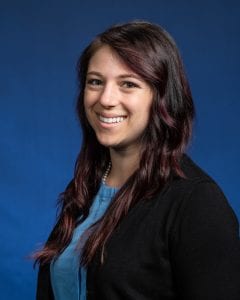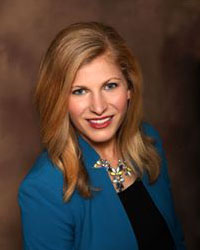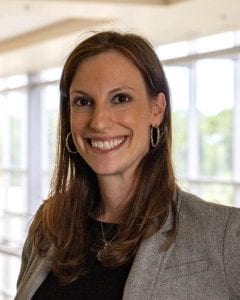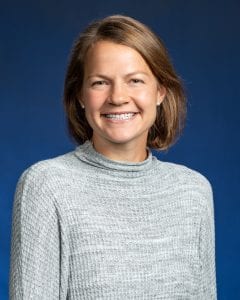
Chelsea LeNoble, Ph.D.
Dr. Chelsea LeNoble is an assistant professor at Embry-Riddle Aeronautical University – Worldwide. Her research focuses on the multilevel factors related to employee engagement, resilience, and recovery from work stress. Part of a new Human Security faculty cluster within the College of Arts and Sciences, Dr. LeNoble works with communication and disaster management scholars to support high-stress occupations such as healthcare workers and first responders. After earning her doctorate in Industrial/Organizational Psychology from Florida Institute of Technology, Dr. LeNoble completed a postdoctoral fellowship with Clemson University and Prisma Health. As an embedded scholar in the health system, she led resilience, leadership, and team development projects alongside physicians, nurses, and healthcare executives.

Kristin Horan, Ph.D.
Dr. Kristin Horan is an assistant professor in the Department of Psychology at the University of Central Florida. Her research focuses on improving health, safety, and well-being in organizations. She has published research on the design, implementation, and evaluation of interventions to improve health, safety, and well-being, the health and safety needs of high-risk occupations, and the relationship between health behaviors and work. She has performed applied research in a variety of populations, including university faculty, staff, and students. Specifically, Dr. Horan has led health interventions for faculty and staff and interventions to increase grit among transfer STEM students. She has obtained external grant funding from both the National Institute of Occupational Safety and Health and the National Science Foundation and serves on the editorial board of Stress & Health. She earned her doctorate in Industrial/Organizational Psychology from Bowling Green State University.

Mindy Shoss, Ph.D.
Dr. Mindy Shoss is an associate professor in the Department of Psychology at the University of Central Florida. Dr. Shoss conducts research in the areas of job insecurity, adaptability, counterproductive work behaviors, and the changing nature of work. Her work has attracted over $2 million in external grant funding from the Army Research Institute, National Institute for Occupational Safety and Health, National Science Foundation, Society for Human Resource Management Foundation, among others. Dr. Shoss is currently Associate Editor of Group and Organizational Management and Guest Editor of Journal of Occupational Health Psychology, and serves on the editorial boards of Journal of Occupational Health Psychology, Journal of Business and Psychology, Journal of Organizational Behavior, Occupational Health Science, Stress and Health, and Journal of Vocational Behavior. She holds a B.A. from Washington University in Saint Louis with majors in psychology and economics, and a minor in applied statistics and computation. She holds a Ph.D. and a M.A. in Industrial/Organizational Psychology from the University of Houston.

Allison Kwesell, Ph.D.
Dr. Allison Kwesell is an Assistant Professor of Risk and Crisis Communication at Embry-Riddle Aeronautical University – Worldwide. She received her M.A. as a Rotary World Peace Fellow (2011 – 2013) and Ph.D. (2014 – 2018) as a Monbukagakusho MEXT (Government of Japan’s Ministry of Education, Culture, Sports, Science and Technology) Scholar at the International Christian University in Tokyo. Dr. Kwesell is a member of the new Human Security faculty cluster within the College of Arts and Sciences, the development team for a new National Center for Emergency Services and Human Resilience, which is recognized by the U.S. Natural Hazards Center. Her research examines crisis and post-crisis situations including communication infrastructures, storytelling networks, effects of media photographs, implications of perceived and self-stigma on vulnerable populations, sustainable recovery, and visual narrative interventions. Dr. Kwesell’s primary research objective examines socio-psychological effects radiation and tsunami evacuees face after the 2011 Fukushima nuclear disaster. Specifically, she studies how communities cope with public health concerns in a post-disaster context.

